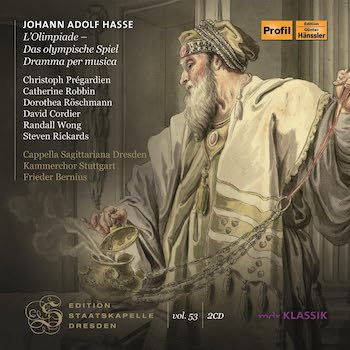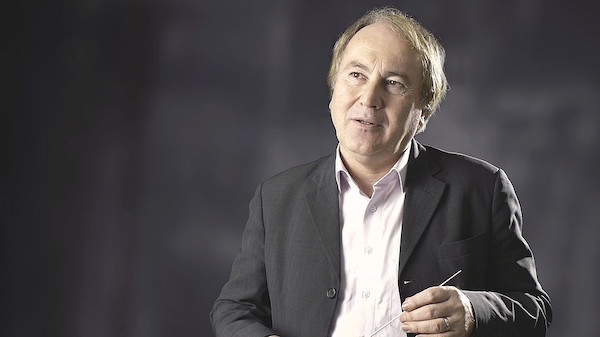Opera Album Review: A Gold-Medal Recording of a Baroque Opera about the Ancient Greek Olympics
By Ralph P Locke
The shamefully belated release of the first recording (1992!) of “L’olimpiade,” a major work by Hasse (a renowned contemporary of Handel and Vivaldi), featuring some of the best singers of the day, including male soprano Randall K. Wong.
HASSE: L’olimpiade.
Dorothea Röschmann (Argene), Catherine Robbin (Aristea), Randall Wong (Licida), Steven Rickards (Aminta and Alcandro), Christoph Prégardien (King Clistene), David Cordier (Megacle).
Stuttgart Chamber Choir, Cappella Sagittariana, cond. Frieder Bernius.
Profil 21053 [2 CDs] 130 minutes

Just in time for the Paris Olympic Games of July/August 2024, here is the belated release of the first and only recording of Baroque composer Johann Adolf Hasse’s remarkably entertaining and affecting opera L’olimpiade (1756), to a text by the renowned Metastasio.
The name Hasse, so little heard today, raises the perpetual question: What is it that ensconces some composers in the public memory and allows others, equally remarkable, to remain stuck in some music-history books (at best)?
Sometimes it’s a single work, or at most a few: Pergolesi has stayed real for us because of La serva padrona (see my review), a much-loved Stabat Mater, and the use that Stravinsky made of some of his pieces in the enchantingly quirky ballet score Pulcinella. Whereas the long-lived Hasse (1699-1783) remains somebody that we’ve, at most, read about: a now-unknown whose well-paid successes in Dresden, during Bach’s years in Leipzig, put the latter’s poorly paid labors in the shade.
Well, no surprise, we have begun to appreciate Hasse’s immense compositional skill, now that performing groups have set about presenting and recording some of his many works. I flipped over his Attilio Regolo and his Enea in Caonia (the latter is about the young Aeneas), and have long known and loved the William Christie recording of Cleofide (about Alexander the Great’s campaign in India).
The present release was recorded in 1992, five years earlier than the Attilio Regolo, and I’m pleased to note that this time all of the singers have voices that fully encompass the range of their parts and that they rarely add long super-high notes or scant the low ones. The work also includes more substantial interventions from the chorus, either on its own or interacting (interestingly) with a vocal soloist. The orchestration is immensely varied and imaginative, with all kinds of fresh and unpredictable string figurations, sudden chordal stabs (in a movement for chorus), and the refreshing appearance of, say, a pair of recorders. As for the arias and duets, they span a wide range of emotions, including violent anger and deep sadness. The duets rearrange the characters in various groupings, so we hear (in this performance) a soprano and a mezzo, or two countertenors (soprano and alto), or one countertenor and one woman, and so on.
The libretto, by Metastasio, was set dozens of times, starting in 1733 (by Caldara, for Vienna). The two most oft-performed settings during the 18th century were by Pergolesi (1735) and Galuppi (1747); Grove/Oxford has high praise for Mysliveček’s setting (1778), and there were other prominent ones by Sarti, Leo, Vivaldi, and Cimarosa. Hasse’s, heard here, is from 1756 (Dresden), and it was splendidly performed at the time by the lavish forces of the court opera, featuring the great Faustina Bordoni (whom Hasse had married in 1730).
The plot is, by modern standards, mind-stressingly tangled, but the situations that are set up are deeply human ones, involving much deceit (and the hiding of information) on the part of people who don’t really mean ill, plus an attempted suicide in the ocean (by Megacle) and a plan (by Licida) to kill the king.

Conductor Frieder Bernius. Photo: BR-Klassik
The action takes place during the ancient Greek Olympic games and involves a loving couple, Megacle and Aristea, who keep getting pulled away from each other, in large part because (as I understand it) Megacle has made the mistake of entering the Olympics under the name of Licida, who was his boyhood friend and is Aristea’s brother. (Some added confusion for non-Italian-speaking listeners comes from the fact that two male characters, Licida and Aminta, have names that end with “a.”) I’ll now ease your worry: Licida turns out to be the king’s long-banished son. He takes the throne and forgives Megacle, thus allowing the latter to marry Aristea. Licida himself weds Argene, who has been present through much of the opera in disguise as a shepherdess.
The recording was made at a single performance without costumes or sets, under the renowned Frieder Bernius (who started his career as a choral conductor). It was originally broadcast on the MDR (Central German Radio, located in Saxony), and now constitutes vol. 53 of the CD series entitled “Edition Staatskapelle Dresden.” The singing and playing are full of character, producing no dull or routine moments. The choral group is full and magnificent, sounding the way strong choral groups do in oratorio recordings.
The best of the soloists are Dorothea Röschmann and Catherine Robbin (whose voices are nicely contrasting, which helped me keep track when I wasn’t following the libretto closely), male soprano Randall Wong (best known perhaps for his singing with the male a cappella group Chanticleer, though I discovered him through that amazing Christie recording of Cleofide), countertenor Steven Rickards, and the masterful tenor Christoph Prégardien (known for his Bach and Mozart and his many lieder recordings; his son Julien now has a major career, likewise as a tenor). Tenor David Cordier is capable but not quite in the same league. The audience goes into rapturous applause after many arias and duets; I found this irritating when listening at home and in the car. I suggest that Profil edit applause out in their future releases.
The booklet contains the libretto in Italian and German, plus very fine essays and informative illustrations in German and sometimes stiff English. The print is often small and pale, and the shaded background on some pages makes reading even harder on an older person’s eyes (says this 75-year-old). For the libretto in a 1767 English translation, a tiny note refers the user to a Google Books site; astonishingly, it works!
I restate what I said six years ago about Attilio Regolo (in American Record Guide, March/April 2018, but here’s an online review in Gramophone): It is surely time for more Hasse operas to be staged and then released on CD or DVD. John Barker (American Record Guide, July/August 2016) was captivated by the CD and DVD releases of Hasse’s Artaserse, in a performance from the 2012 Valle d’Itria Festival: “Hasse gave all of these roles some dauntingly virtuosic music, and this excellent cast brings it all off admirably.”
I might add that hearing some fine but unknown operas may help get us out of the rut of performing the same few Baroque operas (such as Handel’s Giulio Cesare) and of course La traviata, etc., again and again in bizarre productions that strive, mostly in vain, to “freshen” an overly familiar work. And Hasse’s Olimpiade, sung this well, would light any operagoer’s torch, even in a non-Olympic year!
Ralph P. Locke is emeritus professor of musicology at the University of Rochester’s Eastman School of Music. Six of his articles have won the ASCAP-Deems Taylor Award for excellence in writing about music. His most recent two books are Musical Exoticism: Images and Reflections and Music and the Exotic from the Renaissance to Mozart (both Cambridge University Press). Both are now available in paperback; the second, also as an e-book. Ralph Locke also contributes to American Record Guide and to the online arts-magazines New York Arts, Opera Today, and The Boston Musical Intelligencer. His articles have appeared in major scholarly journals, in Oxford Music Online (Grove Dictionary), and in the program books of major opera houses, e.g., Santa Fe (New Mexico), Wexford (Ireland), Glyndebourne, Covent Garden, and the Bavarian State Opera (Munich). He is part of the editorial team of Music & Musical Performance: An International Journal, an open-access source that includes contributions by performers (soprano Elly Ameling) as well as noted scholars (Robert M. Marshall) and is read around the world. The present review first appeared in American Record Guide and appears here with kind permission.
Tagged: "L’olimpiade", Frieder Bernius, HASSE, Profil

